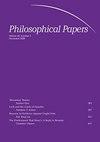Emerson's Literary Philosophy
IF 1.3
3区 哲学
0 PHILOSOPHY
引用次数: 0
Abstract
This new study of RalphWaldo Emerson deserves praise for its effort to place his writing within the tradition of philosophy as a way of life. Drawing on the work of Pierre Hadot, Reza Hosseini proposes a long-overdue reframing of Emerson’s philosophy that departs from epistemologizing readings and returns to the fundamental question of the conduct of life. To this end, the author draws on the influence of the Socratic tradition but also on Emerson’s abiding passion for the Persian poetry of Rumi, Hafiz, and Saadi. This combination of classical and Eastern sources constitutes by far the most original contribution of the book. What the two traditions share, on this account, is a vision of literary excellence as furthering a philosophical mode of existence. The ‘essence’ of Emerson’s ‘literary philosophy’ lies in the adoption of this transcultural model for his own writing (145). The Introduction and the second and final chapters (‘Socrates and Emerson on Areté’ and ‘Emerson’s Literary Humanism: The Persian Connection’) define the concepts informing the study as a whole. Areté, or ‘excellence’—with Emersonian self-reliance being the ‘arêté of the mind’ (26)— serves the ends of psychagogia, or ‘influencing the soul through the power of words’ (6), which enables a move beyond the aporiae of the early Socratic dialogues (12). Thus literary excellence is less an end in itself than ameans of ‘moral persuasion to change our way of seeing the world’ (5), the better to escape aporetic impasses by responding positively to philosophy’s call for a new art of living in the world with intelligence, beauty, and grace. In the author’s view, the Persian concept of Adab, or ‘literary humanism’ (7, 122), best captures this broader cultural, philosophical, and practical aim that takes us beyond the merely belletristic, on the one hand (123–124), and the egoistic limits of self-culture or Bildung, on the other (7, 123). The third chapter focuses on Emerson’s style, and it is here that the most serious conceptual and methodological problems first appear. Taken together, they reflect unresolved theoretical difficulties with the term literary —by which the author really means ‘humanist’—and a problematic practical relation to the Emersonian text itself—a relation all too often distant or mediated where it should be direct and demonstrative. ‘The question of style’ (35) is answered with summaries of scholarly opinion on the subject Philosophical Papers爱默生的文学哲学
这项关于爱默生的新研究值得赞扬,因为它努力将他的写作作为一种生活方式置于哲学传统之中。Reza Hosseini借鉴了Pierre Hadot的作品,提出了一个早该对爱默生哲学进行的重构,该重构偏离了认识论解读,回到了生命行为的根本问题。为此,作者借鉴了苏格拉底传统的影响,也借鉴了爱默生对鲁米、哈菲兹和萨阿迪波斯诗歌的持久热情。这种古典和东方来源的结合构成了该书迄今为止最具原创性的贡献。因此,这两种传统的共同点是,将文学卓越视为一种哲学生存模式的进一步发展。爱默生“文学哲学”的“本质”在于他自己的写作采用了这种跨文化的模式(145)。引言以及第二章和最后一章(“苏格拉底和爱默生论阿雷特”和“爱默生的文学人文主义:波斯联系”)定义了整个研究的概念。Areté,或“卓越”——爱默生式的自力更生是“心灵的存在”(26)——服务于心理狂热的目的,或“通过语言的力量影响灵魂”(6),这使我们能够超越早期苏格拉底对话的典范(12)。因此,卓越的文学本身与其说是一个目的,不如说是一种“改变我们看待世界的方式的道德说服”(5),通过积极回应哲学对以智慧、美丽和优雅的方式生活在世界上的新艺术的呼吁,更好地摆脱了狂热的僵局。在作者看来,波斯的阿达布概念,或“文学人文主义”(7122),最好地抓住了这一更广泛的文化、哲学和实践目标,一方面,它使我们超越了单纯的美女主义(123-124),另一方面,超越了自我文化或毕尔当的利己主义极限(7123)。第三章集中讨论爱默生的风格,最严重的概念和方法问题就是在这里首次出现的。总之,它们反映了文学一词尚未解决的理论困难——作者真正的意思是“人道主义者”——以及与爱默生文本本身的一种有问题的实践关系——这种关系往往是遥远的或中介的,而这种关系本应是直接的和示范的。”“风格问题”(35)的答案是对哲学论文主题的学术意见摘要
本文章由计算机程序翻译,如有差异,请以英文原文为准。
求助全文
约1分钟内获得全文
求助全文
来源期刊

Philosophical Papers
PHILOSOPHY-
CiteScore
2.10
自引率
0.00%
发文量
18
期刊介绍:
Philosophical Papers is an international, generalist journal of philosophy edited in South Africa Original Articles: Articles appearing in regular issues are original, high-quality, and stand-alone, and are written for the general professional philosopher. Submissions are welcome in any area of philosophy and undergo a process of peer review based on initial editor screening and refereeing by (usually) two referees. Special Issues: Topic-based special issues are comprised of both invited and submitted papers selected by guest editors. Recent special issues have included ''Philosophy''s Therapeutic Potential'' (2014, editor Dylan Futter); ''Aging and the Elderly'' (2012, editors Tom Martin and Samantha Vice); ''The Problem of the Criterion'' (2011, editor Mark Nelson); ''Retributive Emotions'' (2010, editor Lucy Allais); ‘Rape and its Meaning/s’ (2009, editor Louise du Toit). Calls for papers for upcoming special issues can be found here. Ideas for future special issues are welcome.
 求助内容:
求助内容: 应助结果提醒方式:
应助结果提醒方式:


